COVID-19 strategy: Here's how Philippines can combat the pandemic, according to a data scientist
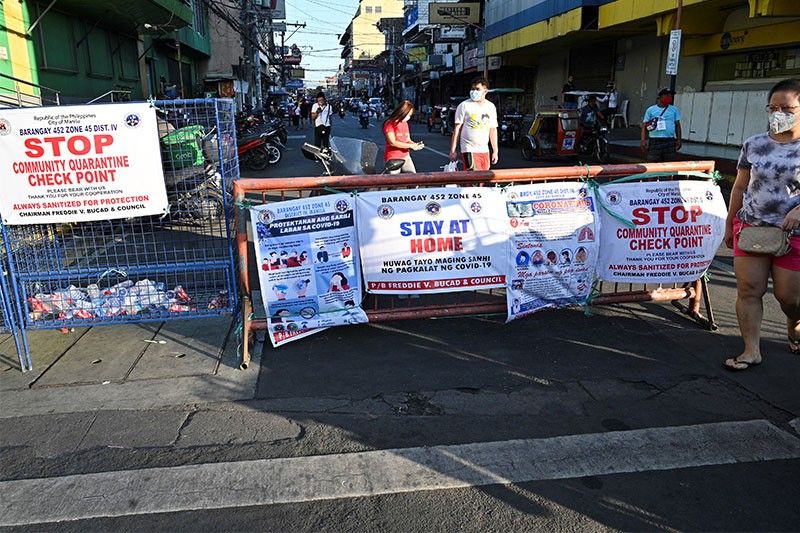
MANILA, Philippines — Aside from implementing an enhanced community quarantine, the Philippines needs to include multiple strategies in its fight against the novel coronavirus disease (COVID-19).
Three weeks into the implementation of the enhanced community quarantine Luzon, the national government has yet to decide whether to lift or extend the lockdown.
Inter-Agency Task Force on the Management of Emerging Infectious Diseases (IATF-EID) spokesperson Cabinet Secretary Karlo Nograles earlier said science would be "in charge" on this matter.
The IATF has a technical working group, headed by the Department of Health, that will "finalize the parameters for deciding on the eventual total or partial lifting of the ECQ in Luzon, the possible extension of its duration, or its expansion to other areas outside the contained area, subject to the approval, amendment or modification by the IATF."
Metro Manila epidemic peak projected between April to June
Data scientists from the University of the Philippines project the virus to infect around 600,000 to 1.4 million individuals in the country, with 80% from Metro Manila.
In its report, the UP COVID-19 Pandemic Response Team emphasized the need for community collaboration to fight the deadly virus, which has infected nearly one million people across the globe.
"This estimate includes possible asymptomatic individuals and unreported cases. The high estimate for Metro Manila is mainly due to the high population size and density of the region," the UP report read.
This projection is based on a reproduction rate between 1.5 to 4, which is the average number of people that will be directly infected by a COVID-19 positive person in a susceptible population.
Based on mathematical simulations, the UP COVID-19 Pandemic Response Team predicted that the peak of the epidemic in Metro Manila will happen between April and June 2020.
As of April 2, the Philippines has detected 2,633 COVID-19 cases, 1,395 of which are in Metro Manila.
"As the government and the public implement interventions, the peak might shift to a later date and may also be flattened," the report read.
Noting that peaks in the provinces might be asynchronous or would not happen at the same time, the UP report pointed out that mobility in and out of provinces should be monitored and regulated to prevent an outbreak.
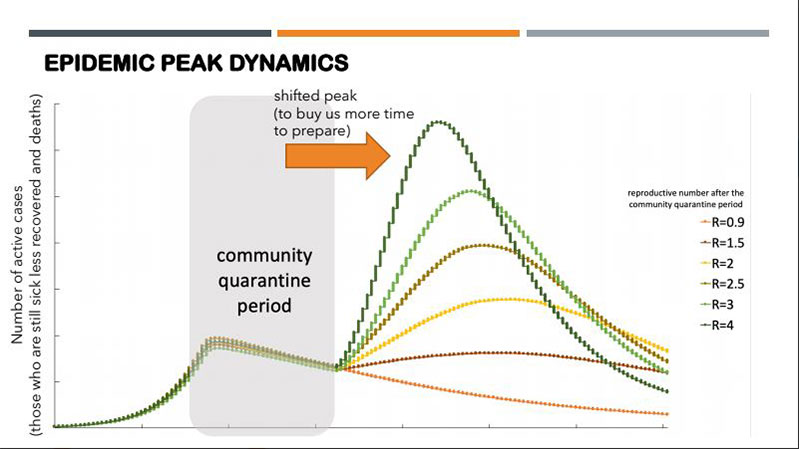
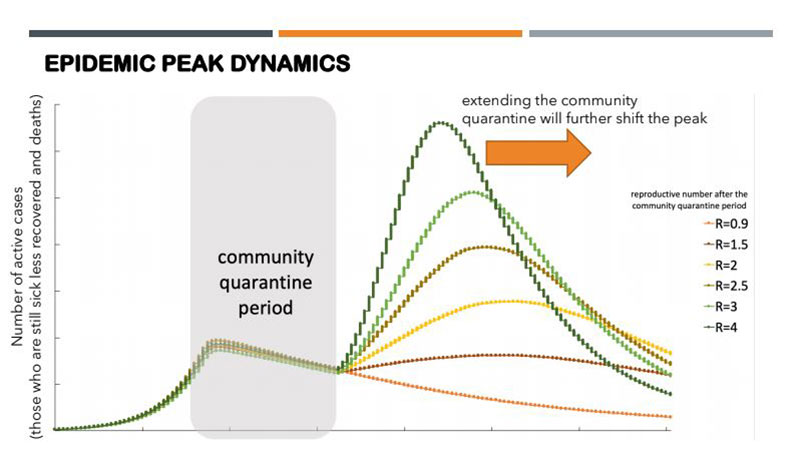
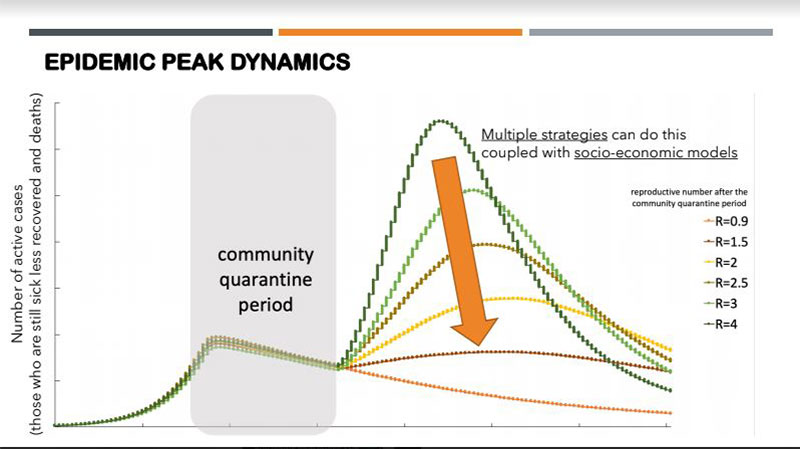
Multiple strategies suggested in war vs COVID-19
Given these circumstances, the UP pandemic team suggested multiple strategies, in addition to the ECQ, in response to the coronavirus outbreak.
These measures include maintaining social distancing and avoiding mass gatherings; inreasing detection and isolation, including mild and asymptomatic cases, to reduce infections; and increasing protection and good personal hygiene to reduce transmission.
UP scientists also proposed to increase clean and safe space and to implement physical distance between random people.
In hospitals, the report suggested to decrease the rate of patient encounter per health care worker, such as implementing a policy of maximum of three encounters per hour in a 12-hour work shift. Another proposal was to decrease the interaction time between the frontline health care worker and patients, with less than 40 minutes for the whole day.
The report also noted that providing protective gears and facilities to frontline health care workers during their shift is 95% effective.
Extending the community quarantine, in addition to multiple strategies mentioned above, are seen to further "shift the peak" of the epidemic to buy more time to prepare.
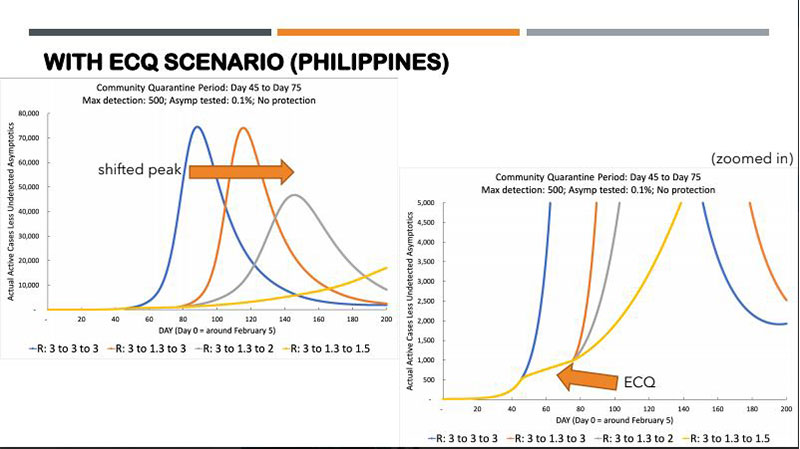
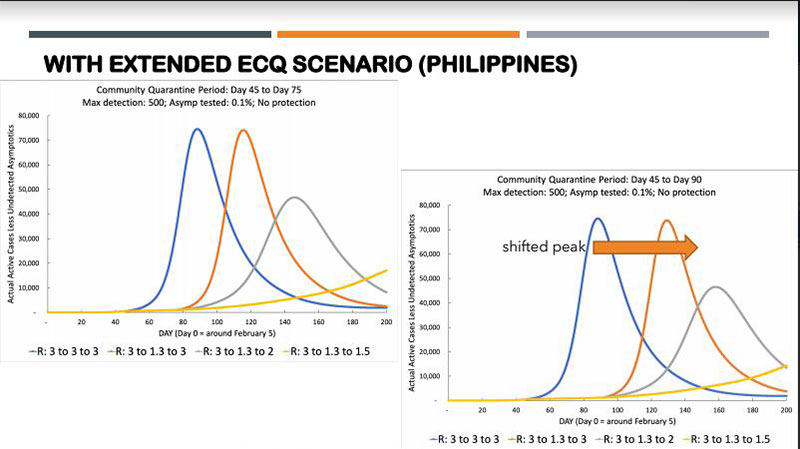
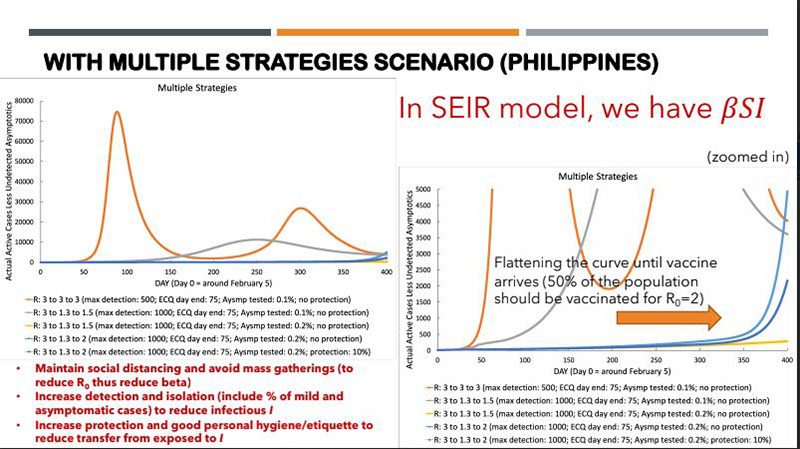
Philippines needs to prepare for long-term
Data scientist Jomar Rabajante, professor at UP Los Baños Institute of Mathematical Sciences and Physics, said the war against COVID-19 is not just in a month but may extend until vaccine arrives, which is expected next year.
Thus, the country needs to be prepared not just during the lockdown period but for the long-term.
"So we need more community collaboration to fight COVID. It is imperative to include multiple strategies not just ECQ, as we need to consider other factors such as socio-economic status of our country," Rabajante told Philstar.com in an online exchange.
On the lifting of the ECQ, Rabajante said that if the government has solid strategies to move forward, the Philippines can do a modified community quarantine, which means that it would be local government unit-based and not national or Luzon-wide.
The UPLB professor also noted that before considering the lifting of the ECQ, LGUs must be equipped to implement protocols, such as regulated travel and quarantine of persons under monitoring and persons under investigation, to prevent initiation of outbreak.
The country should also have enough hospital beds, equipment, personnel and other healthcare support in case of a surge in the number of cases, he said.
"If the public is already prepared to change their 'epidemic-friendly' practices. That is, can we still maintain physical distancing in public (e.g. inside MRT)? Can we maintain or improve our personal hygiene habits? If not, then it is dangerous," Rabajante told Philstar.com.
He also noted that the country's hospitals should also have enough detection capability to identify those who are infected and isolate them immediately.
While the Philippines has yet to acquire vaccine and COVID-19 drugs, the country should at least have a strategy to control transmission to vulnerable people, such as the elderly and those who have weak immune system.
"If the government can guarantee enough provision of economic resources for vulnerable communities then ECQ can be extended, or else we need modified [community quarantine] where socio-economic factors are considered," Rabajante said.
Mass testing to start April 14
On Thursday evening, Presidential Peace Adviser Carlito Galvez Jr., chief implementer of the national policy against COVID-19, announced that the government is planning to start mass testing of PUIs and PUMs starting April 14.
Earlier this week, the Food and Drug Administration (FDA) approved the use of five rapid test kits for the new coronavirus.
The FDA is also expected to issue a certificate of product registration to locally-made test kids on April 3. These test kits were developed by scientists from the University of the Philippines National Institutes of Health and the Philippine Genome Center, which will be manufactured by Manila HealthTek Inc.
“The Manila HealthTek Inc. reported that the first batch of reagents has arrived which will enable them to start the manufacturing process to create additional kits that can accommodate 120,000 tests,” the DOST earlier said.
Follow this page for updates on a mysterious pneumonia outbreak that has struck dozens of people in China.
New Zealand Prime Minister Chris Hipkins says on Sunday that he had contracted COVID-19, testing positive at a key point in his flailing campaign for re-election.
Hipkins saYS on his official social media feed that he would need to isolate for up to five days -- less than two weeks before his country's general election.
The leader of the centre-left Labour Party said he started to experience cold symptoms on Saturday and had cancelled most of his weekend engagements. — AFP
The World Health Organization and US health authorities say Friday they are closely monitoring a new variant of COVID-19, although the potential impact of BA.2.86 is currently unknown.
The WHO classified the new variant as one under surveillance "due to the large number (more than 30) of spike gene mutations it carries", it wrote in a bulletin about the pandemic late Thursday.
So far, the variant has only been detected in Israel, Denmark and the United States. — AFP
The World Health Organization says on Friday that the number of new COVID-19 cases reported worldwide rose by 80% in the last month, days after designating a new "variant of interest".
The WHO declared in May that Covid is no longer a global health emergency, but has warned that the virus will continue to circulate and mutate, causing occasional spikes in infections, hospitalisations and deaths.
In its weekly update, the UN agency said that nations reported nearly 1.5 million new cases from July 10 to August 6, an 80% increase compared to the previous 28 days. — AFP
The head of US intelligence says that there was no evidence that the COVID-19 virus was created in the Chinese government's Wuhan research lab.
In a declassified report, the Office of the Director of National Intelligence (ODNI) says they had no information backing recent claims that three scientists at the lab were some of the very first infected with COVID-19 and may have created the virus themselves.
Drawing on intelligence collected by various member agencies of the US intelligence community (IC), the ODNI report says some scientists at the Wuhan lab had done genetic engineering of coronaviruses similar to COVID-19. — AFP
Boris Johnson deliberately misled MPs over Covid lockdown-breaking parties in Downing Street when he was prime minister, a UK parliament committee ruled on Thursday.
The cross-party Privileges Committee said Johnson, 58, would have been suspended as an MP for 90 days for "repeated contempts (of parliament) and for seeking to undermine the parliamentary process".
But he avoided any formal sanction by his peers in the House of Commons by resigning as an MP last week.
In his resignation statement last Friday, Johnson pre-empted publication of the committee's conclusions, claiming a political stitch-up, even though the body has a majority from his own party.
He was unrepentant again on Thursday, accusing the committee of being "anti-democratic... to bring about what is intended to be the final knife-thrust in a protracted political assassination".
Calling it "beneath contempt", he said it was "for the people of this to decide who sits in parliament, not Harriet Harman", the veteran opposition Labour MP who chaired the seven-person committee. — AFP
- Latest
- Trending































